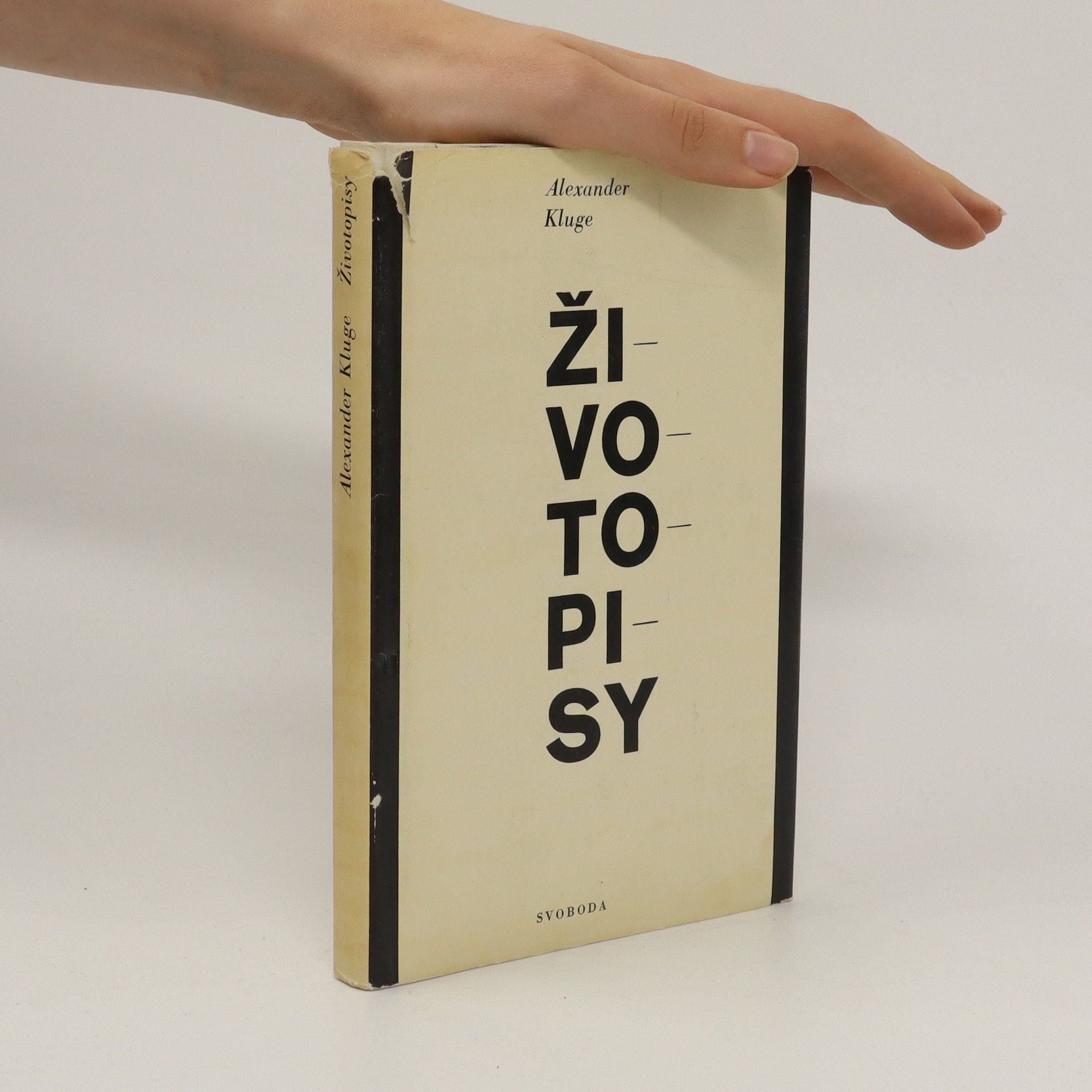Jde o životopisy, zčásti vymyšlené, zčásti nevymyšlené; dohromady tvoří truchlivou historii.
Alexander Kluge Knihy






Zkáza šesté armády
Popis jedné bitvy
Jedinečná "grandiózní asambláž", jíž byl sestaven z vojenského dokumentárního materiálu nevšední obraz bitvy u Stalingradu a zániku Paulusovy šesté armády, je "umělecké dílo složené z mnoha neuměleckých součástí". Za oficiálními zprávami z fronty následují upravující direktivy pro tisk, německé směrnice pro válku v zimě, kázání vojenských kněží a montáž faktů a údajů i hledisek, čerpaných od přímých svědků boje a od Hitlerovy generality,jejíž členové jsou zároveň autorovou popisnou metodou výstižně portrétováni. Z německého originálu "Schlachtbeschreibung" a s přihlédnutím k vydání "Der Untergang der Sechsten Armee" přeložil Karel Richter. Doslov napsal Ludvík Kundera. První vydání.
A book about bitter fates--both already known and yet to unfold--and the many kinds of organized machinery built to destroy people. Alexander Kluge's work has long grappled with the Third Reich and its aftermath, and the extermination of the Jews forms its gravitational center. Kluge is forever reminding us to keep our present catastrophes in perspective--"calibrated"--against this historical monstrosity. Kluge's newest work is a book about bitter fates, both already known and yet to unfold. Above all, it is about the many kinds of organized machinery built to destroy people. These forty-eight stories of justice and injustice are dedicated to the memory of Fritz Bauer, a determined fighter for justice and district attorney of Hesse during the Auschwitz Trials. "The moment they come into existence, monstrous crimes have a unique ability," Bauer once said, "to ensure their own repetition." Kluge takes heed, and in these pages reminds us of the importance of keeping our powers of observation and memory razor sharp.
The Book of Commentary / Unquiet Garden of the Soul
- 292 stránek
- 11 hodin čtení
A highly engaging exploration of existential questions, written in the midst of the Coronavirus pandemic. The Book of Commentary / Unquiet Garden of the Soul confronts the reader with questions of existential meaning, questions rendered all the more potent by the backdrop of the Coronavirus pandemic: How fragile are we as human beings? How fragile are our societies? What is a "self," an "I," a "community"? How are we to orient ourselves? And what, if any, role does commentary play? In a fashion that will be familiar to longtime admirers of Alexander Kluge, the book stretches both back in time to the medieval glossators of Bologna and forward into interstellar space with imagined travel to the moon Europa. Kluge's characteristic brief, vignette-like prose passages are interspersed with images from his own film work and QR codes, forming a highly engaging, thoroughly contemporary read.
An intellectually stimulating yet accessible collection of short vignettes on Russia and Germany by Alexander Kluge. Not just in light of a contested pipeline during the war in Ukraine but also after centuries of both exchange and rejection, Russia and Germany were and are as far away from each other as they are intrinsically linked. The geopolitical present seems critical, the signs pointing towards conflict and polarity. In this hot climate, German author Alexander Kluge makes Russia the exclusive subject of his latest book, offering multiple perspectives: from that of the historical German patriots of the Napoleonic Wars of Liberation to the narrative point of view of Franz Kafka and Heiner Müller; from messianic yearning and utopian expectations of the twentieth century to the full-blown or near-miss catastrophes in the atomic age. Composed in Kluge's characteristic short-prose vignette style, interspersed with numerous images and often humorous asides, Russia Container is yet another brilliant and thought-provoking work from one of Europe's most prolific and deeply intellectual literary genius. The volume includes a preface specially written to engage with the current events in Ukraine, making Kluge's narratives even more timely and topical.
In a world full of devils, the giant ape Kong defends what he loves the most. But who and what is this undomesticated animal? Might it reside within us? As we tread confidently, is this where the earth opens up beneath us? In Kong’s Finest Hour, Alexander Kluge explores anew the accessible spaces where Kong dwells within us and in our million-year-old past. The more than two hundred stories contained in this volume form a chronicle of connections that together survey these spaces using diverse perspectives. These include stories about the folds of Kong’s nose, the voice of the author’s mother, the poet Heinrich von Kleist and Jack the Ripper, the indestructability of the political, and the supercontinent Pangaea that once unified the earth. Dissolving theory into storytelling has been Kluge’s lifelong pursuit, and this magnificent collection tells stories of people as well of things. First in a series of Kluge’s Chronicles forthcoming from Seagull Books, Kong’s Finest Hour will delight those familiar with his writing as well as introduce readers to the brilliance of one of Germany’s greatest living writers.
December
- 118 stránek
- 5 hodin čtení
April 30, 1945, marked an end of sorts in the Third Reich. The last business day before a national holiday and then a series of transfers of power, April 30 was a day filled with contradictions and bewildering events that would forever define global history. It was on this day that while the Red Army occupied Berlin, Hitler committed suicide in his underground bunker, and, in San Francisco, the United Nations was being founded. Alexander Kluge’s latest book, The 30th of April 1945, covers this single historic day and unravels its passing hours across the different theaters of the Second World War. Translated by Wieland Hoban, the book delves into the events happening around the world on one fateful day, including the life of a small German town occupied by American forces and the story of two SS officers stranded on the forsaken Kerguelen Islands in the South Indian Sea. Kluge is a master storyteller, and as he unfolds these disparate tales, one unavoidable question surfaces: What is the appropriate reaction to the total upheaval of the status quo? Enriched by an afterword by Reinhard Jirgl, translated by Iain Galbraith, The 30th of April 1945 is a riveting collection of lives turned upside down by the deadliest war in history. The collective experiences Kluge paints here are jarring, poignant, and imbued with meaning. Seventy years later, we can still see our own reflections in the upheaval of a single day in 1945.
Anyone Who Utters a Consoling Word Is a Traitor
- 120 stránek
- 5 hodin čtení
A book about bitter fates—both already known and yet to unfold—and the many kinds of organized machinery built to destroy people.Alexander Kluge’s work has long grappled with the Third Reich and its aftermath, and the extermination of the Jews forms its gravitational center. Kluge is forever reminding us to keep our present catastrophes in perspective—“calibrated”—against this historical monstrosity. Kluge’s newest work is a book about bitter fates, both already known and yet to unfold. Above all, it is about the many kinds of organized machinery built to destroy people. These forty-eight stories of justice and injustice are dedicated to the memory of Fritz Bauer, a determined fighter for justice and district attorney of Hesse during the Auschwitz Trials. “The moment they come into existence, monstrous crimes have a unique ability,” Bauer once said, “to ensure their own repetition.” Kluge takes heed, and in these pages reminds us of the importance of keeping our powers of observation and memory razor sharp.
Circus Commentary
- 208 stránek
- 8 hodin čtení
Through a global geopolitical lens, the book delves into the circus as a reflection of human experience, showcasing its duality as both a symbol of work and a celebration of excellence. Kluge's fascination with the circus weaves together fictional and non-fictional narratives, capturing the chaos and beauty of civilization's journey. The inclusion of QR codes enhances the experience with images and film sequences, presenting a diverse array of characters, from artists to animals, and memorializing their extraordinary performances amidst the complexities of life.